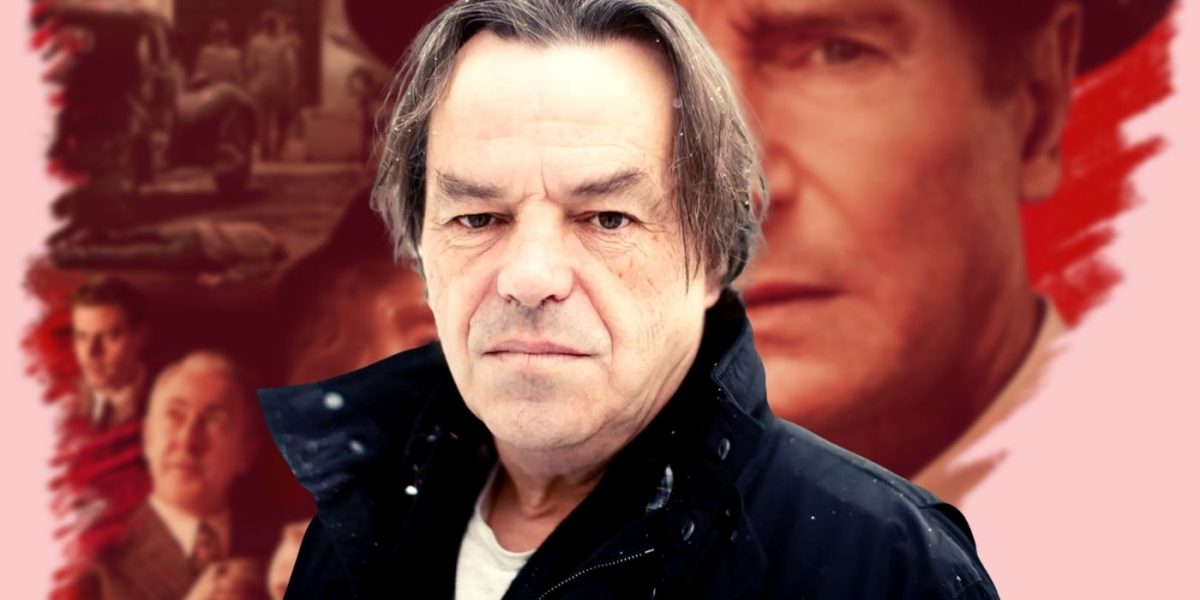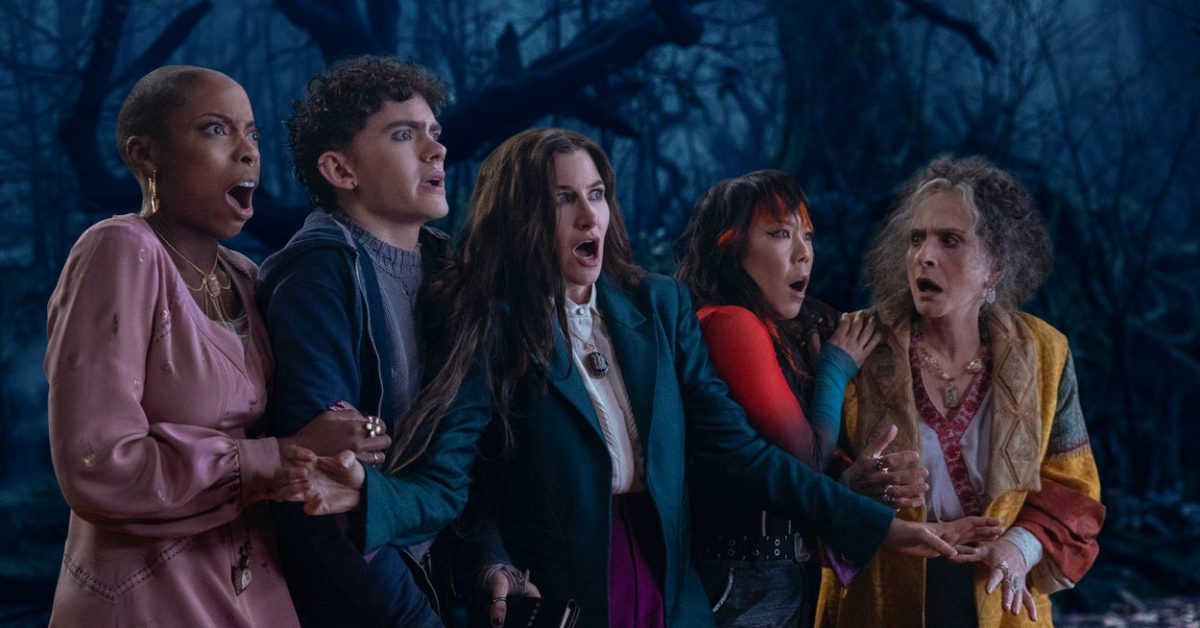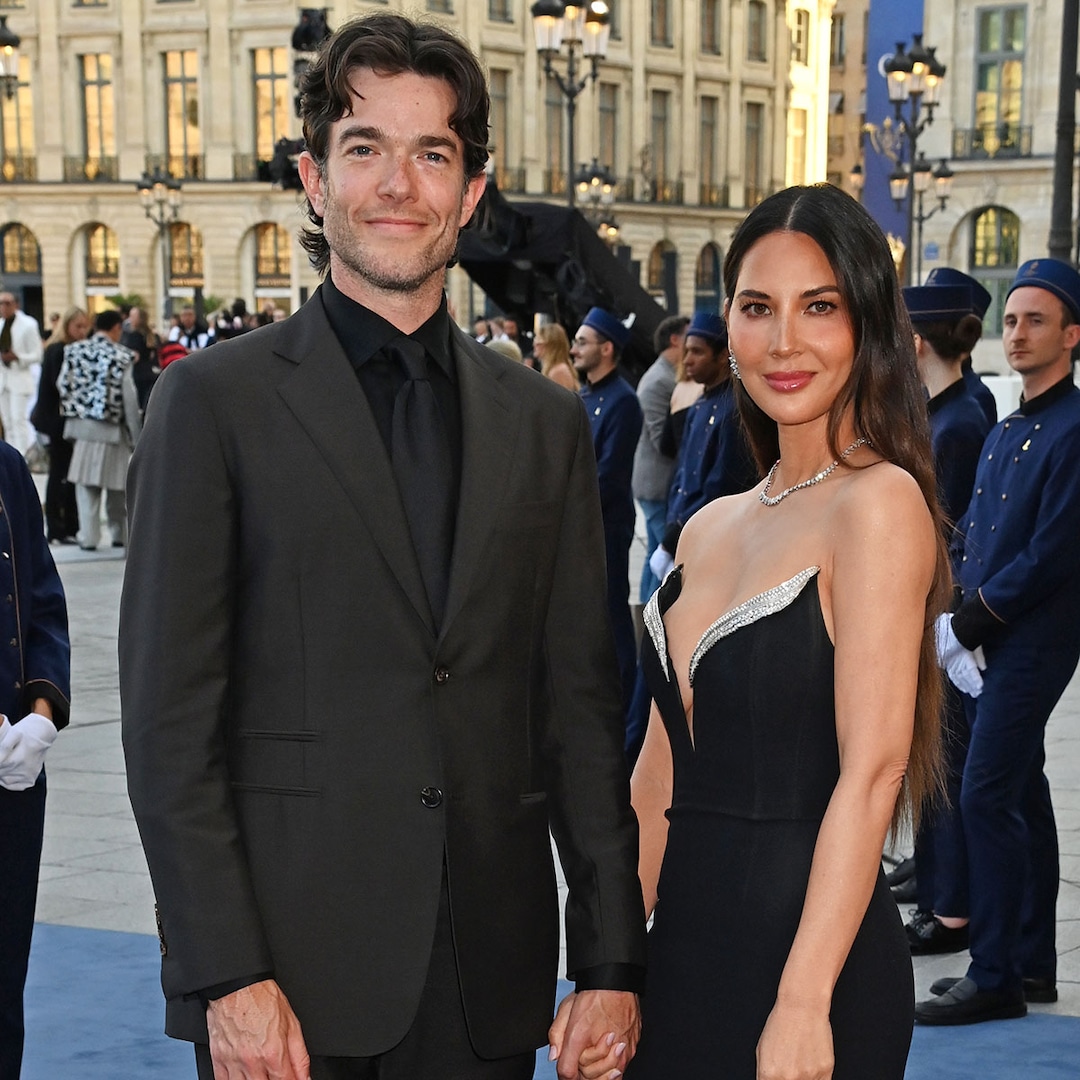
Neil Jordan on Directing Marlowe & Why Avatar 2 Is His Favorite Film of 2022
Feb 14, 2023
For Liam Neeson’s hundredth film, the actor is reuniting with Academy Award-winning filmmaker Neil Jordan on the noir thriller, Marlowe. The Irish writer, producer, and director is known for his varied filmography, which ranges from the supernatural to crime thrillers like his Oscar-winning feature, The Crying Game. He’s also the man behind 1994’s classic adaptation, Interview with a Vampire, starring Tom Cruise and Brad Pitt, and is the creator of the Showtime series, The Borgias.
Teaming up with screenwriter William Monahan, Jordan, and an ensemble cast of stars, recreate Old Hollywood in the late ‘30s. Inspired by author John Banville’s novel, The Black Eyed Blonde, and a character originated by Raymond Chandler, Marlowe is a classic noir mystery that sees femme fatale, Clare Cavendish, played by Diane Kruger, seeking the service of private detective Philip Marlowe (Neeson). It seems Clare’s lover has gone missing, and she isn’t the only one in LA hoping he’ll turn up. While investigating the disappearance, Marlowe encounters a number of characters with concerns for this man’s whereabouts, and whether or not he stays gone. Marlowe also stars Jessica Lange, Alan Cumming, Colm Meaney, and Danny Huston.
COLLIDER VIDEO OF THE DAY
Ahead of Marlowe’s theatrical release on February 15, Collider’s own Steve Weintraub spoke with the director about the film. During his interview, Jordan discusses his reunion with Neeson, the challenge of doing rewrites on Monahan’s script, and explains how they recreated Hollywood in the ‘30s by going to Spain. He also reveals why The Crying Game almost had a “really horrible” ending, the original runtime for Interview with a Vampire, and which of his novels he’s currently reworking into a script. You can check out all of this and more in the full transcript below.
COLLIDER: If someone has never seen anything that you’ve directed before, what is the first thing you want them watching, and why?
NEIL JORDAN: My last movie, I would say. I mean, each time I make a film, it’s almost like I’ve never done it before. You know that kind of thing? So, I don’t know, really. What else? I made a movie called Company of Wolves years ago, that is kind of wild and wonderful. But I genuinely would say the last thing I’ve done.
Does that also apply if I ask the same question about your novels?
JORDAN: Yes.
So it’s always the most recent thing?
JORDAN: Well, at the moment, it’s the unpublished novel. I’ve just finished a novel. It’ll be coming out in about five months. So I would like people to read that. Well, I don’t know really. People don’t know me as a writer, they know me as a filmmaker mainly. I’m surprised you even mentioned novels, but they know me generally as a filmmaker, and sometimes people read my novels and they think the person who made the movies is a different person. It’s strange. It’s kind of odd that way.
Image via Open Road Films
If you could get the financing to make anything that you want, what would you make and why? This is a question for people that have a script in the desk that they’ve been trying to make forever.
JORDAN: I wrote a novel called The Drowned Detective. It’s a ghost story. It’s set in Budapest, and actually, as we speak, I’m rewriting the script that I wrote some years ago for that. I would love to make that. I really would. And I will make it.
Are you rewriting it because someone’s interested, or are you rewriting to try to get someone interested?
JORDAN: No. It’s a strange process with me. I mean, I tried to get it going about five years ago, and I’ve just realized actually the script isn’t finished. It’s a weird thing. I sent a script around, and it often happens that you don’t realize something has not reached its perfection in a strange way. Or in this case, I realized that what I wrote before was a little bit too complicated. It’s a ghost story. It’s a ghost story involving a detective and a dead person. So I would love to make that, and I probably will make it quite soon. Yeah.
I’m not sure if you pay attention to the Oscars, but I’m curious if you want to share your thoughts on all the Irish love this year.
JORDAN: Oh, it was good. Cool. Lovely. Yeah, I was amazed that (writer/director) Martin McDonagh made everybody so intrigued by that idea of that friendship. I love that movie saying, the basic line is, “I don’t like you anymore.” “What do you mean you don’t like me? You always like me.” “No, I just don’t like you anymore.” I thought, “How great.” I thought that was an eccentric rather wonderful idea. Two friends, and the explanation of why the friendship has ended never comes. I thought it was cool.
I have to say, the movie I enjoyed most this year, and people are going to hate me for this, was James Cameron’s [Avatar: The Way of Water].
Image via Open Road Films
Really?
JORDAN: There you go. You didn’t think I’d say that now, did you? But that’s the truth.
I think Cameron did a phenomenal job with it. You know how hard it is to get people into a movie theater.
JORDAN: And he’s doing it. It’s being done. I’m surprised that a lot of people were just a bit quite iffy about that film. I mean, I’m sure [there are] things weak with the story and all that sort of stuff, but the immersive spectacle was just kind of thrilling and almost spiritual, I thought. And people are going to see it, of course, aren’t they? Yeah.
Listen, my favorite scene in the movie is when the kid is with the whale in the ocean, and they’re just together, and it’s quiet, and they’re just having-
JORDAN: And the whale talks to him. [Laughs]
Yeah.
JORDAN: It’s great. Okay, good. Good, good, good. It’s like we’re watching two different worlds of movies, aren’t we really? You know what I mean? Wonderful movies have come out this year, really wonderful ones, very small ones. And then you have these huge spectacles. Are they even the same medium? I’m not sure they are.
Listen, we could have a whole conversation. I definitely want to talk to you about your movie. I’m a fan of when you and Liam [Neeson] are together. What did it mean to you to make Liam’s 100th film?
JORDAN: Sorry, I wasn’t even aware this was Liam’s 100th film when we made it. I was just aware that I was sent a script by the great William Monahan. Liam Neeson wanted to play Philip Marlowe. I thought, “Okay, I’ll be there for that. I’d love to see that.” I would’ve been asked to direct it, “Great, even better. I’ll do my best.” But I only discovered recently that it was Liam’s hundredth movie. That’s a lot of movies to have made, isn’t it? Yeah. Really is.
Image via Open Road Films
100, absolutely. I’m a huge fan of William Monahan’s work, and I’m curious, I know you made some changes in terms of adding a Hollywood storyline, but what was it like reading his script and then adding what you wanted to add? That collaboration?
JORDAN: Well, it’s kind of terrifying because William had written all these wonderful dialogue scenes, and I normally direct my own stuff. If I don’t direct my own stuff, I normally rewrite extensively. But in this case, I didn’t. What I added to it was basically the last third of the film, I would say is mine. Do you understand what I mean? It’s more mine than William’s, let’s put it that way. But William had written all these wonderful dialogue scenes. So as a director, I have to make them live, and I have to create this dance with the camera and the characters and the dialogue that he’s written. I have to make it not only live, but I have to make it make sense. It was quite a challenge, actually. Because normally, I do my own stuff.
William had written very, very dense dialogue, [a] very dense sense of characterization, a very, very subtle and sly sense of wit. It was full of references to the genre, or let’s call it the Chandler-esque genre, and it was full of references to Old Hollywood, Hollywood of the period. It was quite a challenge. But I loved it. I loved doing it.
One of the things I commend you on is, when I watch a film like this, or when there’s a mystery and you’re trying to figure things out, when you only have one actor that the audience recognizes besides your main character, you know that person is the guilty party. What I like about Marlowe is all your main supporting actors are actors you would recognize. You really don’t know who is going to be the person pulling all the strings. So, can you talk about the importance of casting Jessica [Lange], Diane [Kruger], Alan [Cumming], Danny [Huston]?
JORDAN: I know exactly what you’re talking about. I mean, the basis for William’s script, basically, was a blonde comes into Marlowe’s office, says, “I want you to find somebody.” Okay? Marlowe meets Diane Kruger, meets Diane, meets the femme fatale, meets Clare. Marlowe meets a succession of characters. Do you understand?
I mean, the first half of the film is Marlowe trudging through the dramatic persona of this film in a way. You know what I mean? And it was great. It’s an opportunity actually to fill it with really good actors. I had Ian Hart play his cop sidekick; I had the wonderful Jessica Lange to play Dorothy Cavendish; I had Diane who was great as Clare; I had Danny, I had Alan Cummings. It’s like Marlowe is penetrating the lies and the presentation of a whole different set of characters through the entire movie. And it was cool. It was really cool. I loved doing that, but it was a challenge, I have to say.
But the main challenge of this was realizing some version of Los Angeles. Los Angeles 1938 doesn’t exist. So I said to the producers, “Look, why don’t we look around the hills of Barcelona so we can get some feeling for what it could have been, or could possibly be?” So we built an alternative version of Los Angeles, almost like an [alternate] reality version of Los Angeles. We found an abandoned paper factory, which we turned into an entire studio. We found Marlowe’s house, we found canyons that could be Benedict Canyon and Laurel Canyon. We recreated the entire city, really, in a different place, which is cool. Lovely to do.
Yeah, I spoke to William Monahan for something a number of months back, and he was telling me about how you shot in Barcelona because you could pull off Los Angeles in the late ’30s in Barcelona.
JORDAN: Yeah, I thought so. Well, I don’t think I could have pulled it off in Los Angeles actually, but it was cool. But it also frees you up as a director, as an image-maker in a way, because you can create images that… you can actually create them from the ground up in a strange way, which is lovely to do, really. It’s inventing a world.
Yeah. Another actor I want to mention, I’m a big fan of Colm Meaney, and you got to put him in this as well.
JORDAN: Yeah. Well, he played Bernie Ohls, didn’t he? Yeah. Colm. Yep. He played Star Trek for years, didn’t he?
That’s where I first saw his work, on Next Generation and Deep Space Nine.
JORDAN: Yeah, yeah. Yeah. [I’ve] know Colm for me for years. It was cool. It was lovely. It was lovely to do that. Yeah, lovely to work with Colm.
So I love talking about the editing process because ultimately that’s where the film comes together. So, how did this film change, or did this film change, in the editing room in ways you didn’t expect?
JORDAN: It became shorter. It became shorter. It became more cogent. I mean, the basic thing that I introduced into the entire story was that – I can say this, I assume – is that Marlowe is asked to find somebody by a client who walks into his office. The entire film is about him finding this person. When he finds this person, he realizes he’s only found this person so his client can kill this person. That’s a kind of story I haven’t seen before, and that’s the story I wanted to tell. That’s the main reason I made the movie.
I don’t know how to answer the question really. It didn’t change that much. It really didn’t change that much. It was quite a simple dynamic to the movie, to the character. I mean, the film’s about a character. The film’s about the character of Marlowe as played by Liam Neeson. The film is about what Marlowe discovers and what kind of emotional journey he goes on. It was a matter of finding out what was important to that journey really.
With all the films that you’ve made, is there one that’s changed dramatically in the editing room in ways you didn’t expect?
JORDAN: Not really. I don’t understand the question.
I’ve spoken to a number of directors who have talked about how radically things can change in the editing room for them. It’s interesting, you’ve obviously not been in that boat. But I talked to Ridley Scott, for example, about Kingdom of Heaven and how he made the mistake of cutting out all this stuff that the studio wanted him to cut, and it ended up being 45 minutes shorter, and it’s a train wreck of a movie, but the director’s cut on Blu-ray is a masterpiece.
JORDAN: Yeah, it was, wasn’t it? I’ve never delivered a director’s cut of a film really. I’ve never had that opportunity, or that kind of indulgence, really. I could deliver a director’s cut of Interview with the Vampire. There were scenes that I took out of that. In fact, when I shot the first movie, I showed it to David Geffen, the producer. I said, “David, it’s far too long.” And David said, because he was so much in love with the film, he said, “Look, I don’t care. I want to preview this with an audience in all its complexity.” And I said, “But, David, it’s too long.”
So we previewed it, and the audience said, “It’s far too long.” And the studio said, “It’s far too long.” I said, “Okay, now can I go back and cut stuff out of it?” Which he allowed me to do. And the movie that was released was the shorter version that I made myself. I mean, I suppose I could go back to the negatives and recreate what initially I showed, but it was still too long.
Can I just ask you? The theatrical cut was two hours and 10 minutes, give or take, if I remember correctly. I could be wrong. But how long was that longer cut that you’re talking about?
JORDAN: Oh, it would’ve been about two hours and 40 minutes, I’d say.
Oh, so it’s like 30 minutes of extra footage?
JORDAN: I would say so, yeah. There were entire scenes that are not in the film, I remember them. But, it’d be an interesting thing to do. I know directors do that all the time. I just haven’t had that indulgence myself to do that. But maybe if nobody hires me ever again, I’ll go back and say, “Okay, I’ll spend my time reconstructing Interview with the Vampire.”
Oh yeah, no. See, I’m a writer basically. Okay? The ways in which I critique my movies are always about the writing. When I made The Crying Game, we found it impossible to finance the film. Stephen Woolley, the producer, we couldn’t get any financing. The main financier, who ended up being the main financier, was a company called Channel Four, and they would only do it – because they didn’t like the ending that I had written, and so I wrote this fake ending, for which there was a reference to Some Like It Hot, and it was really fucking horrible. Excuse me. This ending was really horrible.
So we’re shooting the movie, and eventually, we had to do this end scene. We just meant to wrap up the whole thing in a user-friendly way. And we had to close down a street, and we had snow machines. I remember saying to the producers, “Look, I hate this. Can this not be in the film, please?” And they said, “No, we have to shoot it because that’s the only reason they gave the financing for it.” I said, “Okay.” So I shot the movie.
I shot the scene, and I show the movie then eventually to the backers, and they say, “Oh, we love it, but the end scene is horrible.” I said, “Okay, you’re right. It’s horrible. Can I shoot the original ending I want now, please?” And they gave me the money to shoot the original ending, which is the ending of the movie. That’s my kind of experience with films.
I haven’t had the resources that Ridley Scott has had, for example. And generally, when I shoot something, there’s so little leeway that what ends up on the screen, is probably the only stuff I have to end up on the screen.
Marlowe hits theaters on February 15. For more on the film you can watch the trailer below.
Publisher: Source link
Every New Character Added To The MCU
Agatha All Along: Every New Character Added To The MCU Realizing that Wanda took all her power, Agatha's solution lies at the end of The Witches' Road, a series of trials that will reward those with what they are missing…
Oct 26, 2024
John Mulaney Shares Emotional Tribute to Wife Olivia Munn
"She shared her story to help anyone she could," John, who wed Olivia in July after three years together, continued. "According to the National Cancer Institute, in the week after Olivia shared the story of her breast cancer journey, there…
Oct 26, 2024
Eva Mendes Said There Have Been Times Where She’s “Regretted” Getting Cosmetic Work Done And Had To “Wait It Out”
Eva, who turned 50 this year, has previously said she would “never deny” getting cosmetic work done.View Entire Post › Disclaimer: This story is auto-aggregated by a computer program and has not been created or edited by filmibee.Publisher: Source link
Oct 25, 2024
Nicole Kidman Confirms Another Iconic AMC Ad Is “In the Making”
Nicole Kidman's 16-Year-Old Daughter Looks All Grown Up in Rare Public AppearanceWe come to this place for Practical Magic. At least, that’s a past role Nicole Kidman is channeling to tease that another AMC ad—like the movie theater chain’s original…
Oct 25, 2024










